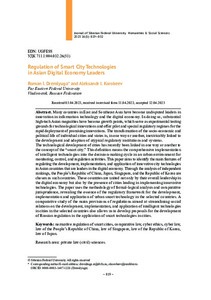Показать сокращенную информацию
Регламентация применения технологий умных городов в азиатских странах – лидерах цифровой экономики
| Автор | Дремлюга, Р. И. | ru_RU |
| Автор | Коробеев, А. И. | ru_RU |
| Автор | Dremlyuga, Roman I. | en |
| Автор | Korobeev, Aleksandr I. | en |
| Дата внесения | 2023-05-16T04:22:46Z | |
| Дата, когда ресурс стал доступен | 2023-05-16T04:22:46Z | |
| Дата публикации | 2023-05 | |
| URI (для ссылок/цитирований) | https://elib.sfu-kras.ru/handle/2311/150124 | |
| Аннотация | Многие страны Восточной и Юго-Восточной Азии вышли в число бесспорных лидеров инноваций в сфере информационных технологий и цифровой экономики. При этом точками роста стали огромные высокотехнологичные азиатские мегаполисы, которые не только служат экспериментальными полигонами для внедрения в эксплуатацию новинок технологической сферы, но и предлагают пилотные и специальные нормативные режимы для быстрого внедрения перспективных инноваций. Трансформация социоэкономической и политической жизни отдельных городов и государств неотъемлемо связана с разработкой и принятием нетипичных институтов и систем нормативного регулирования. Технологическое развитие городов в последнее время так или иначе связано с понятием «умный город». Данная дефиниция означает широкое внедрение интеллектуальных технологий в цикл принятия решений в городской среде для мониторинга, контроля и распорядительной деятельности. Цель настоящей работы – определение основных особенностей регламентации разработки, внедрения и применения технологий «умных городов» в странах Азии, лидирующих в сфере цифровой экономики. Посредством анализа независимых рейтингов в качестве таких стран выбраны Китайская Народная Республика, Сингапур, Республика Корея и Япония. Данные страны объединяет не только общее лидерство в цифровой экономике, но и наличие городов, лидирующих по внедрению умных технологий. Проведение сравнительного исследования основных положений нормативных актов, направленных на упорядочивание общественных отношений по поводу разработки, внедрения и применения интеллектуальных технологий в городах выбранных стран, также позволяет выработать предложения по развитию российского регулирования в сфере применения умных технологий в городах. В работе используется методология формально-логического анализа и сравнительного правоведения, что позволяет раскрыть сущность основ регулирования разработки, внедрения и применения городских интеллектуальных технологий в выбранных странах | ru_RU |
| Аннотация | Many countries in East and Southeast Asia have become undisputed leaders in innovation in information technology and the digital economy. In doing so, substantial high-tech Asian megacities have become growth points, which serve as experimental testing grounds for technological innovations and offer pilot and special regulatory regimes for the rapid deployment of promising innovations. The transformation of the socio-economic and political life of individual cities and states is, in one way or another, inextricably linked to the development and adoption of atypical regulatory institutions and systems. The technological development of cities has recently been linked in one way or another to the concept of the “smart city.” This definition means the comprehensive implementation of intelligent technologies into the decision-making cycle in an urban environment for monitoring, control, and regulation activities. This paper aims to identify the main features of regulating the development, implementation, and application of innovative city technologies in Asian countries that are leaders in the digital economy. Through the analysis of independent rankings, the People’s Republic of China, Japan, Singapore, and the Republic of Korea are chosen as such countries. These countries are united not only by their overall leadership in the digital economy but also by the presence of cities leading in implementing innovative technologies. The paper uses the methodology of formal-logical analysis and comparative jurisprudence, revealing the essence of the regulatory framework for the development, implementation and application of urban smart technology in the selected countries. A comparative study of the main provisions of regulations aimed at streamlining social relations on the development, implementation, and application of intelligent technologies in cities in the selected countries also allows us to develop proposals for the development of Russian regulation in the application of smart technologies in cities | en |
| Язык | ru | ru_RU |
| Издатель | Siberian Federal University. Сибирский федеральный университет | en |
| Тема | нормативная регламентация умных городов | ru_RU |
| Тема | сравнительное правоведение | ru_RU |
| Тема | киберэтика | ru_RU |
| Тема | киберправо | ru_RU |
| Тема | право Китайской Народной Республики | ru_RU |
| Тема | право Сингапура | ru_RU |
| Тема | право Республики Корея | ru_RU |
| Тема | право Японии | ru_RU |
| Тема | normative regulation of smart cities | en |
| Тема | comparative law | en |
| Тема | cyber ethics | en |
| Тема | cyber law | en |
| Тема | law of the People’s Republic of China | en |
| Тема | law of Singapore | en |
| Тема | law of the Republic of Korea | en |
| Тема | law of Japan | en |
| Название | Регламентация применения технологий умных городов в азиатских странах – лидерах цифровой экономики | ru_RU |
| Альтернативное название | Regulation of Smart City Technologies in Asian Digital Economy Leaders | en |
| Тип | Journal Article | ru_RU |
| Контакты автора | Дремлюга, Р. И.: Дальневосточный федеральный университет Российская Федерация, Владивосток | ru_RU |
| Контакты автора | Коробеев, А. И.: Дальневосточный федеральный университет Российская Федерация, Владивосток | ru_RU |
| Контакты автора | Dremlyuga, Roman I.: Far Eastern Federal University Vladivostok, Russian Federation; dremliuga.ri@dvfu.ru; ORCID: 0000-0003-1607-1228 | en |
| Контакты автора | Korobeev, Aleksandr I.: Far Eastern Federal University Vladivostok, Russian Federation; akorobeev@rambler.ru | en |
| Страницы | 819–832 | ru_RU |
| Журнал | Журнал Сибирского федерального университета. Гуманитарные науки 2023 16 (5). Journal of Siberian Federal University. Humanities & Social Sciences 2023 16(5) | en |
| EDN | UGFESS |

